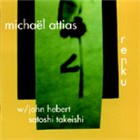Home » Jazz Articles » Album Review » Micha: Renku
Micha: Renku
Although references to Ornette Coleman's trios have their place, this band's interaction and overall sound is more in line with the late Thomas Chapin's trio recordings for Knitting Factory, where each member held equal weight and was capable of highly intricate passages. And although Attias contributes the bulk of this material, reflecting all the aforementioned references in some manner, Renku stands as an original statement spurned on by consistent invention—from the spatial free setting of "Snow to the theme of the album's odd-meter walking opener, "Dark Net, which dissolves and resurfaces throughout its three minute performance.
Throughout, the trio works with a singular mind. Herbert provides a deep, thick tone that often serves as the touchstone while probing for his own statements. Takeshi once again shows his customary depth of listening and technique. Not unlike Hamid Drake, he imbues the music with a sense of daring through an ability to work in free, straight, or folk-oriented contexts. His features on compositions like "The Crunch often favor a paced and conversational feel, rather than bombast or crescendos of press or cymbal rolls.
Attias pulls compositional ideas from Braxton's knotty, complex realm, Thelonious Monk, and other translated artistic mediums. "Renku is named after a form of Japanese poetry where a Haiku (containing lines of five, seven, and five syllables respectively) is linked with another two line stanza (seven syllables each) to form a longer form. Attias translates the form, and the group improvises over the converted metric structure until it ultimately folds in on itself.
Attias plays with a lyrical edge that sticks close to the developed melody, but also manifests an angular flow reminiscent of Chapin's, but with a slightly more bitter feel. The approximately five-minute title piece is indicative of how each of these tracks work within their own framework, rarely being stretched beyond their inherent life. Improvisations or solos are consistently ingrained within these constructs, contributing to the structure from which they are generated. This is evident even in two short improvised pieces that follow their own logic.
Ultimately, Renku is a confident trio statement. Attias, Herbert, and Takieshi have forged a standout recording that marks the emergence of a significant new voice on the alto saxophone. It also marks another impressive release from Playscape Recordings.
Note: Credo, a sextet album from Attias, will be released this winter on Clean Feed.
Track Listing
Dark Net; The Crunch; Renku; King Fish; Slow Arrows; Lumbago Boogaloo; Hotel New #1; Horse Fly; Loom; Ciao Monkey; Snow; Work.
Personnel
Michael Attias
saxophoneMicha
Album information
Title: Renku | Year Released: 2005 | Record Label: Playscape Recordings
< Previous
A Finnish Feast: Hundreds of Free Son...
Comments
About Michael Attias
Instrument: Saxophone
Related Articles | Concerts | Albums | Photos | Similar ToTags
For the Love of Jazz
 All About Jazz has been a pillar of jazz since 1995, championing it as an art form and, more importantly, supporting the musicians who create it. Our enduring commitment has made "AAJ" one of the most culturally important websites of its kind, read by hundreds of thousands of fans, musicians and industry figures every month.
All About Jazz has been a pillar of jazz since 1995, championing it as an art form and, more importantly, supporting the musicians who create it. Our enduring commitment has made "AAJ" one of the most culturally important websites of its kind, read by hundreds of thousands of fans, musicians and industry figures every month.




















